Romney’s Closing Speech Was Good, But Was It Good Enough?
Mitt Romney's speech last night was the best he's ever given, but it's impact may have been undercut but several odd production decisions that preceded it.
After about twenty hours of speeches spread over three days, the Republican National Convention came to an end last night with Mitt Romney addressing the delegates, and the nation, in a speech that is likely to set the tone for the rest of the race:
TAMPA, Fla. — Mitt Romney accepted the Republican presidential nomination on Thursday by making a direct appeal to Americans who were captivated by President Obama’s hopeful promises of change, pledging that he could deliver what the president did not and move the country from its worst economic downturn since the Great Depression.
The speech by Mr. Romney, delivered on the closing night of the Republican convention, signaled an attempt to redefine the race around his business background, which Democrats have spent the summer attacking. He urged voters not to feel guilty about giving up on Mr. Obama, even if they were proud to support him as the nation’s first black president.
“You know there’s something wrong with the kind of job he’s done as president,” Mr. Romney said, “when the best feeling you had was the day you voted for him.”
But even as Mr. Romney delivered a pointed critique of Mr. Obama’s domestic and foreign policy, saying that he had “thrown Israel under the bus,” he also used the marquee speech of his campaign to make a case for himself. He invited people from each chapter of his life to paint a humanizing portrait to help voters see him with a trusting eye.
“This president can tell us it was someone else’s fault. This president can tell us that the next four years he’ll get it right,” Mr. Romney said. “But this president cannot tell us that you are better off today than when he took office.”
With 67 days remaining before Election Day, the presidential race has been essentially locked in place, with each side hoping to win over a small slice of the electorate that is still undecided. The Democratic Party will offer its rebuttal at its own convention next week in North Carolina, with voters being left to judge whether either party advanced its case.
The speech loomed as Mr. Romney’s most important since he began openly exploring his presidential aspirations nearly a decade ago. It was an opportunity to present himself to Americans who are just now beginning to tune in to this campaign and to make the case against Mr. Obama, particularly to the people who voted for him.
“If you felt that excitement when you voted for Barack Obama, shouldn’t you feel that way now that he’s President Obama?” Mr. Romney said.
The Republican convention, which had been delayed earlier in the week by Tropical Storm Isaac, ended in a rousing and respectful acclamation for Mr. Romney. While he has often been viewed with suspicion by conservative activists, he is now widely seen in a new light as a man who stands a strong chance of winning back the White House.
In a campaign where foreign policy has often been a side note, Mr. Romney showed that he does not intend to shy away from aggressively challenging Mr. Obama’s foreign policy. He said the president had “abandoned our friends in Poland,” been duped by Iran and been too weak toward Russia.
“Every American was relieved the day President Obama gave the order and SEAL Team 6 took out Osama bin Laden,” Mr. Romney said. “But on another front, every American is less secure today because he has failed to slow Iran’s nuclear threat.”
Nate Silver observed that the Mitt Romney we saw last night was the essentially true to form:
TAMPA, Fla. — The risk-taking Mitt Romney who picked Representative Paul D. Ryan as his running mate was not on display in Tampa on Thursday night.
Instead, in accepting the Republican nomination, Mr. Romney delivered a mostly well-written and reasonably well-delivered speech — but one that largely avoided policy substance or sweeping narrative, instead seeking to turn the election back into a referendum on President Obama.
(…)
Mr. Romney’s strategy was pretty clear. He was seeking to fulfill the role of the generic Republican — a safe and unobjectionable alternative with a nice family and a nice career – and whose main credential is that he is not Mr. Obama, the Democratic president with tepid approval ratings and middling economic numbers.
It may be a smart approach. Mr. Obama’s approval ratings remain only break-even. A clear majority of voters still think the country is on the wrong track. Somewhat contrary to the conventional wisdom, the economy does not necessarily point to a defeat for Mr. Obama based on the models that political scientists and economists use to describe it — but it is not making Mr. Obama’s re-election effort easy.
To the extent there is a metric that clearly reads negatively for Mr. Romney, it is the respective favorability ratings of the candidates. Mr. Obama’s ratings remain net-positive in most polls, while Mr. Romney’s remain net-negative.
It was in seeking to remedy that difference where Mr. Romney’s speech most broke out of its shell: first, in trying to give voters permission to vote Mr. Obama out of office even if they like him personally; and second, with a series of nostalgic and sometimes touching moments about Mr. Romney’s family.
Peter Suderman, on the other hand, takes Romney to task for the relative lack of substance:
It’s kind of amazing, actually. Romney managed to say even less about what he would do as president than he usually does. Despite Republican Vice Presidential nominee Paul Ryan’s promise earlier today that Romney would discuss his plans for the country in “granular” detail, Romney offered almost nothing in the way of a governing vision, much less specific legislative goals. Instead, he criticized Obama for running up too much debt, and, in practically the same breath, for cutting spending on Medicare and the defense budget. Vote Republican!
Joe Klein, however, argues that the lack of substance doesn’t really matter, and calls the speech “smart”:
I think Mitt Romney just gave a very smart speech. It wasn’t a particularly stirring one, and it was certainly as insubstantial as any I’ve ever heard. It was rhetorical comfort food, a Father Knows Best speech. And perhaps the perfect antidote to the rhetorical excesses of all sorts we’ve experienced over the past four years-not just the President’s, but those of Romney’s own party
(…)
I am not sure the speech was “a game-changer.” I am not sure it “moved the needle.” I’m not sure it will be remembered beyond tomorrow, or that it was watched by sufficient numbers of people tonight to make a difference. But it did lay down a subtle challenge for the President: Explain why your contract should be extended. Explain it in a way we can understand. And it laid down a stylistic challenge as well: in these difficult times, is it really necessary for you to accept your nomination in a football field in front of 74,000 people (as Obama will next week)? Do we really need those bread and circuses?
Romney’s speech added zilch to the substance of the campaign, but it may change the tone. If this is the candidate Romney really wants to be, it will be more difficult for his sleazy array of casino and fossil-fuel plutocrats to flood the air with negative ads-the contrast with the candidate he purports to be will be too stark-but it will also be harder for the President to continue his demolition job on his opponent. We will see how long the quiet glow lasts. But I don’t think I’ve ever seen such an unexceptional speech set such a powerful mood. It was certainly Romney’s best night as a candidate.
I tend to agree. Say whatever one might about the speech itself, I think it was the best speech that Romney could have given as a candidate and I’d challenge anyone to name another speech he’s given that was any better. Going into last night, Romney needed to make two cases to the American public. The first is one that other speakers had been making all week at the convention, that the country is headed in the wrong direction and that the man currently occupying the White House isn’t capable of reversing course either because he advocates the wrong policies or because he lacks the leadership skills. The second task was to make the case that he’s the man to hand the task to, and that he’s both competent enough and compassionate enough to do the job. On that argument he was aided to a great degree by the speakers that came before him, including members of the Mormon community he’d led in Massachusetts who spoke of the work that he did, often in very emotional terms. There were also several speakers from Romney’s days at Bain, including Tom Stemberg, the co-founder of Staples, who spoke of the work Romney did there in a far more detailed manner than either the campaign or the RNC had in the past. Romney picked up on both of these themes in his speech, talking about his faith and his time at Bain in far more detail than he had in the past. As James Joyner noted, Romney did try to spin the story of the creation of Bain Capital in a manner that doesn’t quite fit in with the real story. I’m honestly not sure why he and his advisers it was necessary to do that. For the most part, though, Romney’s speech did what it needed to do by introducing him, again, to the American public and setting the tone for the campaign. I don’t think anyone could have reasonably expected him to do any better than he did last night.
The problem for Mitt Romney is that his speech may have been undercut by some very bizarre stage management on the part of the people who ran and the convention. As they had the two night’s before, the three broadcast networks only covered the 10-11pm hour of the convention and the cable news networks, while present in the convention hall and broadcasting, spend the two hours before that switching between covering speeches and subjecting audiences to “analysis” by their experts. As a result, many people didn’t see what may have been some of the most effective parts of the night, the speeches by Romney’s former congregants and business associates. If they tuned into the broadcast networks, they also did not see the particularly effective Romney tribute video, because it played before the 10:00 Eastern hour. Instead, the first thing they saw was the utterly bizarre and completely inexplicable performance by Clint Eastwood that, while amusing for many of the people in the hall, completely stepped all over the theme of the night, which was supposed to be Mitt Romney. That Eastwood performance burned up fifteen minutes of the most important hour of the night. Indeed, perusing the morning shows this morning it seemed like there was more discussion of the Eastwood performance than there was of the candidate’s speech. Click on over the Memeorandum this morning and you’ll find the top third of the page taken up by links to articles about Eastwood, not Romney. That is proof right there that the entire Eastwood stunt was a mistake.
In the end, I’m not sure any of that will matter. Voters aren’t likely to remember very much about Romney’s speech over the next ten weeks, and the only thing they’ll remember about Clint Eastwood is the fact that he was there. However, there were several blown opportunities here, specifically in the area of allowing the public to see the private side of Mitt Romney. Instead of a rambling monologue by an aging Hollywood star, we should have seen one of those testimonials from Romney’s fellow Mormon’s, or his co-workers at Bain, or even that campaign video, which is usually the traditional way that the nominee is introduced. There were no major disasters here, just a whole lot of missed opportunities, and in an election as close as this one, every missed opportunity is one that could end up being very important.
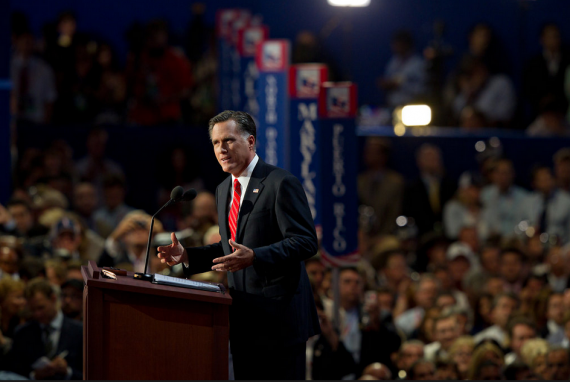

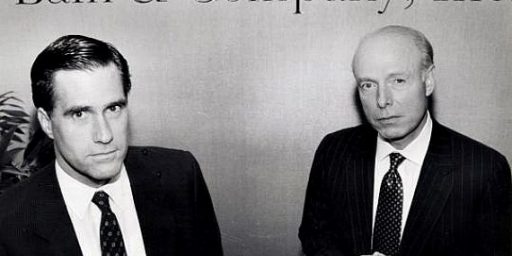
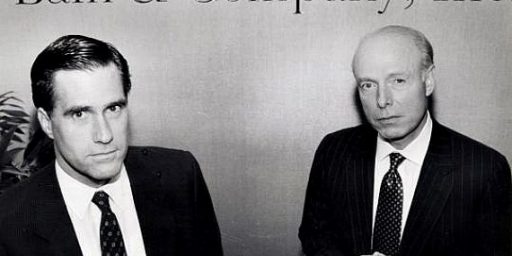
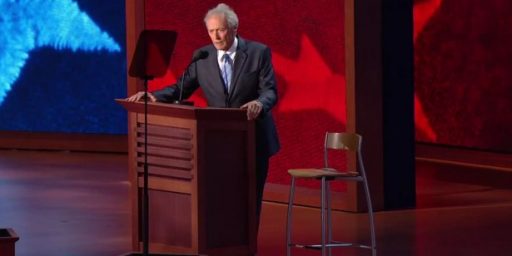
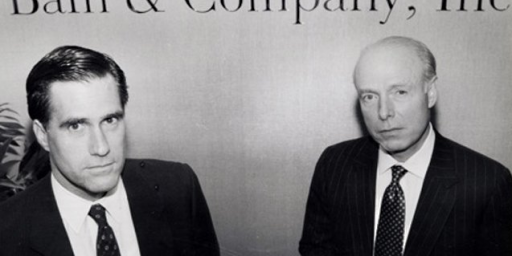

It was a solid single up the middle. It was very Romney-an – it could have been a powerpoint presentation, or with a little more time, or presented on a dry-erase marker board on the lawn in the Capitol Mall. He did what he had to do – not screw it up – and he did it well. However, it wasn’t so riveting that people will be talking about it next Monday.
I’d say that Christie, Rubio and Rice did quite well and outperformed Romney.
I’m betting he gets enough of a bump for the convention to be declared a success and then forgotten. If there’s no momentum in the polls, it becomes part of the Romney narrative and then that’s trouble.
Here’s uber-sycophant Fred Barnes:
If The Weekly Standard isn’t willing to go out on a limb and proclaim real victory, then maybe he’s headed for two months of being the obvious loser.
This private side of Romney nonsense is only important because his campaign is so utterly barren when it comes to actual policy. Romney’s trying to run as a fixit man who won’t tell you how he’s going to fix things. Nixon had a secret plan for Vietnam. Romney has a secret plan for EVERYTHING. If Romney could have gotten up on that stage and rattled off a series of concrete and detailed proposals to address America’s woes, or at least had such proposals to which he could refer, I think his image among voters would have vastly improved.
Mike
The most interesting thing to me is that both campaigns must surely be planning post-convention pivots to new messages. I kind of worry that Romney can pick up some swing voters with nothing more complicated than “business good, government bad.” It’s the “what have the Romans ever done for us?” line.
You now, except for better sanitation and medicine and education and irrigation and public health and roads and a freshwater system and baths and public order… what have the Romans done for us?
There is a belief shared among the writers of this blog that most people hopefully won’t remember anything about the Romney campaign but will vote for him anyway.
Whatever you may have thought about the content and delivery of Romney’s speech, when everyone is instead talking about a crazy old man and a chair, the outcome is not “good”.
@MBunge:
Back in 2008, McCain had a secret plan for getting Osama bin Laden…
I think reminding voters about candidates and their secret plans would be good idea for the Obama campaign.
Obama didn’t go on about secret plans during the last campaign. No secret plan for health care, no secret plan to get Osama bin Laden.
There’s health care reform and Osama bin Laden is dead.
That’s pretty smart. If he can make that stick he has a real chance.
My favorite part of the speech…
Yes, back when America was #1; when we all knew we lived in the Greatest Country in the History of the World; when you needed something really big done, you called upon America.
You know… thanks in part to that massive government spending project.
That went over quite well in that tax-payer funded arena.
Cheers.
@john personna: Two thumbs up for the Monty Python reference. I agree.
@john personna:
Obama did try to explain ” what the Romans have done for us” but he misspoke and the Republicans twisted it into the “you didn’t build that/ we did build that” meme.
I don’t know if Obama can turn that around. I think it’s worth a try, though. It’s an important part of the argument about what we want from government.
@Ebenezer_Arvigenius:
Are you married? Do you still feel the same excitement today, as the day you got married? If not, should you divorce and marry someone else?
Paid for by American business and workers who were not yet being strangled by government.
Economist Sumner Slichter observed in the early 1950s that we no longer had free enterprise but government-guided enterprise. It was a time when John L. Lewis held the power the Progs still lament was once held by J.P. Morgan.
Unfortunately, as so often happens when those with no business sense take over, be they lawyers in the C-suite or lawyers in government, we’ve been guided over the cliff with the cold hands of bureaucrats wrapped around throats of small business.
Maybe distraction was exactly what the Romney camp wanted from Eastwood.. Clint gets the headlines, Romney slips a generic, detail-free speech under the radar, and can keep running a little longer as Not Obama without getting pinned down and fact checked on his own policies.
@JKB:
Here’s a little blast from the present, Adventures in tea-party cognitive dissonance
The small government Tea Party wants more carrier groups.
@JKB: “Economist Sumner Slichter observed in the early 1950s that we no longer had free enterprise but government-guided enterprise.”
Okay, just to keep track, even the 1950s were not economically free enough for the right. Given the government control of pretty much everything in the war years of the 1940s, that decade is also out. So, the conservative message is that we need to restore the American that existed no later than the 1930s. Well, they did come damn close to recreating The Great Depression.
Mike
Fact free as usual, JKB. Heavy on the emotional imagery, though.
The 50s and 60s had their faults for sure, but one thing you cannot credibly say is that it was a bad time for the US economy.
Ever since 1980, this country has elected a lot of Republicans repeating the Reagan mantra about government being the problem. There have been a number of changes to the tax code, and most of those changes have shifted the tax burden from the top to the middle. Remember, in the 80s, it wasn’t just that the high-end rates and capital gains rates were cut. FICA was increased (to pay for SS & Medicare down the road).
Romney/Ryan WANT TO DO THIS AGAIN. More high-end tax cuts, more military spending, and vouchers for medicare (plus significant but unspecified cuts to other non-military spending).
This makes no sense, JKB, unless your primary interest is to help out the struggling billionare. That’s not gonna help small businesses.
True but it isn’t what you say, it is what you convey. And how you say it. Had Obama related how past and present we invest in common infrastructure and common services for the benefit of those that pay taxes as well as those that do not, then he would have conveyed a very different message. But he didn’t his tendency is to view government as separate from the people, above the people and a force to impose upon the people; taking sustenance by taking from the people.
Not surprising really, Obama and the Progs do not view government as servant of the people but rather lord of the people. Those that work in government as masters rather than employees. Government as force to impose upon the People as if we live our lives by the leave of some sovereign, politician or their petty bureaucrat.
@JKB:
I’m sure when you say these things to an empty chair you see it bow to the irresistible force of your brilliance.
However, when you address them to sentient beings we can’t help but notice the lack of recognizable correspondence with reality.
Perhaps you’d be better off haranguing the furniture.
@john personna:
Uh… peace?
@OzarkHillbilly:
Not lately 🙁
@JKB:
Why could he turn on Obama for saying the same thing? Because his base is primed for “government is the problem” and a funny kind of blindness. Everything that government does is bad “except for better sanitation and medicine and education …”
They say things like “yeah, yeah, roads we know” and then just like John Cleese ignore it and go on.
Sorry, link.
It was a base hit, the problem is Romney has been stuck on first since 2010.
But who could possibly feel any excitement voting for Mitt Romney?
Oh really? You, of all people, don’t consider a top tax rate of 70% to be strangulation by the government? There may be some hope for you yet!
Basically this sums it up. Other than people very interested in politics, I doubt anyone will remember what was said. In fact, I suspect the majority won’t even have heard it (I’m in that number – I’d have to be really bored to spend half an hour listening to a politician making promises he’s never going to keep anyway).
Come to think of it, I don’t think I’ve ever listened to more than a minute or two of an inaugerial speech from any politician in any party, either in the US or Canada. And I suspect that minute or two puts me ahead of most folks.
The election will be decided in the last month. Before then, most people just have too many other things going on to really pay much attention to what any politician says. From now til October is like the pre-season – interesting for pundits, but not something most folks pay much attention to.